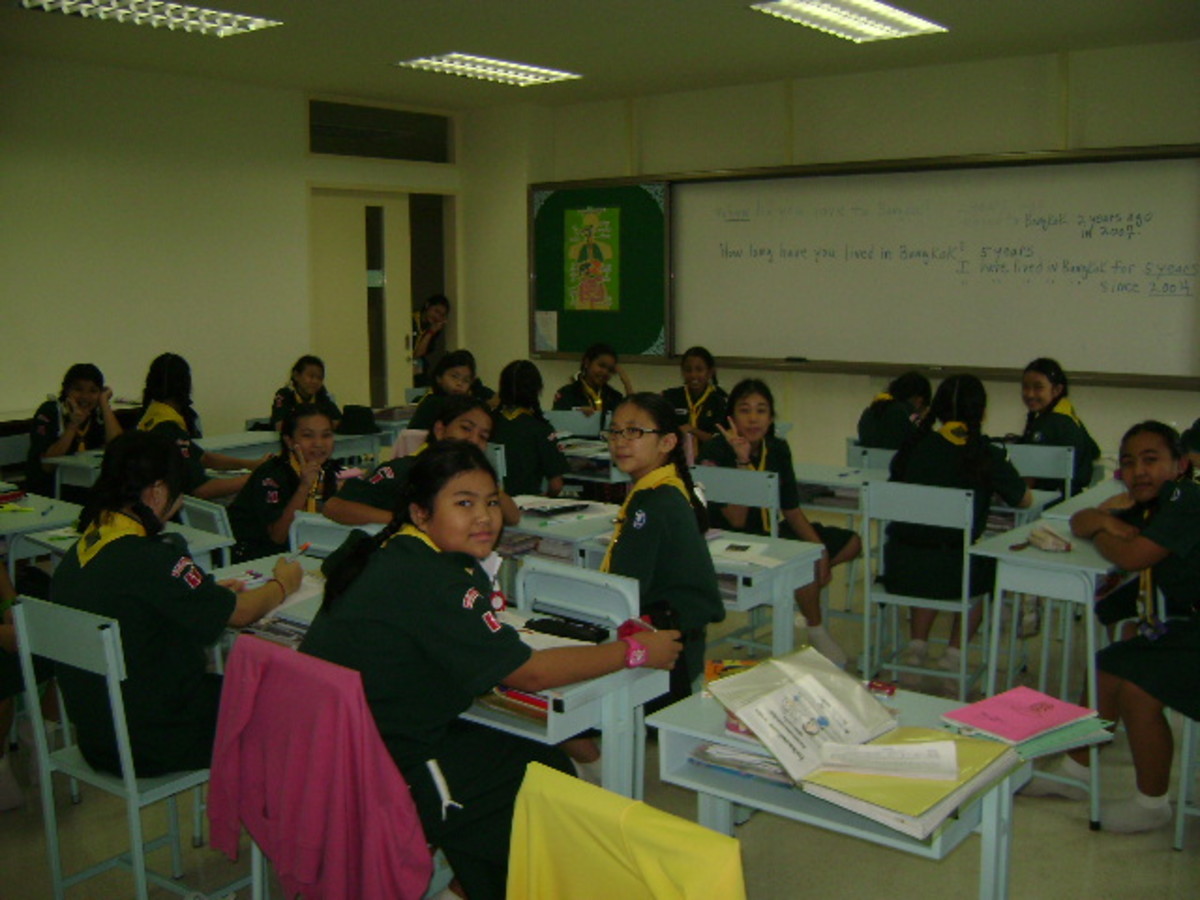Learning tips: How to study smart!
The new school year is here once again. Obviously the prime objective for a successful year is to learn and to retain all the given information. So knowing how to effectively study is vital and retaining that gathered information in turn will guarantee higher grades.

Reading all the assigned material, writing all the required papersand trying to memorize all the subject matter etc. might be enough tospew most of it back at the times of exams however unless the materialis totally digested and understood it will not stay. Even though youhave worked your butt off it will fade away into oblivion soon.
Moststudents no matter what the age, whether high school, college oruniversity think of studying as reviewing...but if the student does not know andunderstand the material in the first place how can it be reviewed.
Allin all the effectiveness and productivity of the time spent studying isnot how much time is spent studying but how well it is done.

So now let's get down to business...obviously Studying has two main parts to it Learning and remembering. Learning is pinpointing all the ideas and facts and understanding them, whereas remembering is absorbing it all into the long-term-storage-unit of the brain.
Lets look at how to learn first, including some learning tips and examples. Please keep an open mind and give these tips a try. Some of these suggestions will work for some and maybe not for others as not everyone learns the same way.
It may come across as a geeky thing to do but it will give you a leg up. Most college and university professors will post the course outlines on-line a week or so before the actual school start. Perusing these outlines along with the book list will point out in which direction the professors are going to be heading throughout the coming semester.
If there is no outline you can make your own list from the chapters and units of the textbooks. Although you might not have all the info in correct sequence or exactly right it will give a rough overview of what will be on the discussion table in the days to come. Once classes start and the profs hand out the outline you can add your notes organized into the right order or sequence. This perusing has more then just one purpose; not only will it produce a workable list of items to come but it will start the brain into thinking and possibly decoding some of the strange new 'language' of the subject. Seeing the spelling and even sounding-out some of the terms that are the fundamentals of the new course before the actual first lecture, can prepare you and help in better understanding. You will be able to listen to all the lecturer is saying, all of your attention focused and not struggling to decipher what some of the lingo or jargon of the subject means. Being somewhat familiar with the direction, the first day in the lecture hall will feel less like a trip into a foreign embassy.
Example#1: the assigned book titles for a Social studies
course is quite extensive. The list consists of an equal number of
books based on socialism and
communism. This will point out the direction or focus of the up-coming
course. If you start your thought process ahead of time, and familiarize yourself with some of
the course outlines and the books on the list, you should be
able to find a common thread between the assigned reading material.
With other words: Check out the course outlines to figure out what the course direction or goal is.
Read-read-read-and read some more.
How often have you heard that before? Read, read and read some more but have you asked yourself this question before? Why am I reading all this? Why do I need to read all these books and articles on the same topic? Each just rehashes the same just from different point of views . Well if the book is a fact based book...you're reading it for facts and information on that given subject. If the book or article is based on someone else's ideas, like the authors...you're reading for the understanding of that given idea. Then last but not least if your reading a piece of fiction... you're supposed to be reading it for fun or for critiquing, just to figure out how the book was put together and why the author chose to write it that particular way.
There you have it all in a nutshell...Reading different aspect about a subject or topic is just a way of opening your mind, which then will create your proficiency and your own attitude toward that particular topic and you're able to come up with an informed opinion.
Just a tangent thought!
Now a different question might arise: If I can get all this know-how from reading these books on any given subject why bother going to classes at all? Why not just do independent studies?
There is an easy answer to that...The get help and other point of views on the topics or ideas. Also, lectures are set-up to highlight important facets of the course, which may not all be available in the books. Lecturers also explain the facts and ideas that are presented in the books or articles. The lecturer will also challenge you to think more and maybe get you to create your own ideas about the given topic.
Know Thy Basics!
This next learning tip might come across as silly but it probably is the most important one of all. Even though it might often be considered as boring but make sure you have all the background information, formulas etc. down pact. ( or better yet somewhere where you can access them at a blink of an eye) There is no way that anyone can learn if the basics are not there.
It's like building the walls of a house... there has to be a foundation or footings for the wall to sit on... the formulas and basics are the footings to your 'mass of knowledge'.
Example #2: Trying to solve Fluid Power or Thermo Dynamics problems is next to impossible without the basic Physics knowledge. Some of these subject matters are based on prior knowledge.
Learn The Lingo!
Every course has its special vocabulary. By isolating those words and learning what they mean you will be able to study faster...learn better. Some ordinary words that can take on a different meaning all together. For instance the word specific means distinct, specified, definite etc using it together as specific gravity means something totally different.
No matter how old fashioned you think using 3x5 file cards is, this method really does work. Each time a professor, lecturer or book defines a term, write it on one side of the card and the definition on the other. This gives you two ways of learning...first by writing things down you commit words into your memory (to write your brain sends the command to your hand which then your eyes acknowledge and then send the image of the written words back to your brain...into your memory file, that's a whole lot of processing which is why the brain remembers that) second these file cards will become a fantastic cram tool for reviews before exams.
There is another way to accomplish your own Glossary. In each of your notebooks (no not 'netbook' I mean real books with paper pages and everything sorry if that sounds sarcastic) commit the last few pages for these specialty terms and their definitions. If time permits in the evening transfer them onto the index cards and/or onto your computer. The more often you manipulate these terms around the more they will sink into your memory file.
Example#3: Going to Paris to take a French Cooking Course you better know the appropriate cooking terms such as a la carte, au jus, au gratin, sauté etc. To follow a simple recipe is not so simple if you do not understand all the terms, vocabulary and the procedure that they each represent.
Also remember that a subject's vocabulary is more then just words and definitions. Science, math, chemistry etc. all have their own wordings and rely on their basic symbols. You should create a file collection for each of these courses. Formulas for math or physics are very much their own vocabulary...
Staying on the same subject...often times authors write on a subject they know inside and out (well pretend to do at least). They then forget that not all who will read the book are as attuned to that particular subject as they are. They use six million dollar words while incorporating topic related jargon only. Even when read aloud, (which is supposedly another manner of learning) everything just comes out as a spewed string of words that leaves the reader with glazed over eyes and the question 'hehhh????' If that type of book ends up on your reading list talk to your instructor...he/she might have an alternative title that is more clearly written which then in turn can make more sense of the original one.
Lets face it no matter what, understanding the simplified version of a subject completely compared to understanding the complicated idea only partially will give you a better chance at passing your tests or exams. (returning to that Know Thy Basics idea again)
Remembering: Part Two of Studying Smart!
Everybody retains information differently. Some can just read a part of a book and remember it down to the smallest detail (very few and far between) for others the same goes only if its something they really are interested in. Others need to write extensive notes and then compile more notes from the notes which they then rewrite again... here are some tips that might just help with cutting down some of that time spent studying while remember more.
With so much of information coming from the Internet nowadays it is important to know how to quick read or scan without losing sight of the gist or substance of the matter.
Association is a powerful prod to your memory. An easy way to prod or train the old memory glands is to try to study the same subject roughly at the same time of day, the same days of the week and at the same location.
For example use the same cubbie at the library on Mondays, Wednesdays and Fridays at 6:00pm to study psychology. Even after a couple of short weeks the brain will automatically associate the location, day and time with psyche and set itself into that mode or mood to study psyche...therefore it will save time and the brain will also remember more of what was studied. This works especially well if the same time frame, location etc is used for reviews before exams, as the brain will absorb and retain more quicker.
However even though that cubbie is the most comfortable use the table on the opposite side of the room at different times of day and different days of the week to study physics or math...establishing a different feel that can be associated with formulas, numbers and what nots...
The brain is like a sponge and will absorb a lot. Remembering something, anything can happen in a couple of different ways.
~One remembering by rote memory which is memorization by repetition.
~Two by associative memory which happens when two things get tied together in the mind.
This is by far the more useful and reliable of the two methods. Even though for either of the two ways to work there needs to be a prep session...no nothing complicated and time consuming... just an opening of the mind, to want to remember. If the brain's convinced that the info is important to remember it will, now convince the brain that it has to remember the data until at least the end of the semester after exams and the brain really will.
To test out both of these theories just think of the computer keyboard, even when typing in the dark the fingers will find what they are 'looking' for, without the eyes actually seeing the keys. This would be a rote memory...memorized by repetition. Whereas just sitting down at the kitchen table at breakfast or lunch time can bring on the feeling of wanting food or drink,... that's association memory.
Eliminate as many distractions as possible.
Unless the studying-work is to memorize song titles or sitcoms do not try to learn anything with the radio or TV blaring. These interferences will take away from the brains power to absorb. If studying is being done at the library or at a public location try to sit away from the main traffic 'highways'. All the senses, sight, sound, smell, touch and taste can cause distractions. During high school most will have done all the studying by listening to music, turn it off now for better memory results. Scientist have done extensive studies and have come up with results that if background noise is important to the student a recording of white noise will lead to higher production less distractions then listening to the new 'Alice in chains' album or such music.
Ideal spacing of time in between studies is pretty near the same for most.
~The first review should take place right after the lesson...within half hour of taking up the new information.
~The second review should take place later that same day before the brain goes for a nap or sleep for the night. Even if it's only rereading the notes created during the day.
~The third review should be done by redoing the notes of the lecture by the weekend.
~The fourth review within the month.
~The fifth review needs to be the most extensive ones just before exams at their usual site and time of day.
Always choose to study in different order.
Usually the beginning lessons are down pact, absorbed and filed in the great filling cabinet in the mind and the latest ones are just iffy. So when studying and reviewing start with the lessons in the middle or evens and odds just so that the information all sinks in with power. To explain that a bit better think of the alphabet...some people, me included, will have to recite the whole abc's when looking in the phone book to determne if the letter 'p' comes before 'o' or after... so it could become with the lessons if they're studied in the same order at all times...vering away from the set path will throw a clincher into the memory processes...
Study smart:
~Find different ways to rewrite the notes while studying or reviewing...
~Pick out keywords and write down a list of these...
~Now scramble them up and try to remember the facts and ideas relating to these key words...
~Reword the facts and ideas from the notes using the list of keywords
~Regroup facts and ideas into categories that make sense under the keyword titles
The big NO-NO!
***However the notes that your best friends older brother took 5 years prior are okay for a quick scan, or as an extra to the subject...
It is important to remember that borrowing or using, even if its only partially, is going to be treated like the crime that it is.***
If the assignment was really great the profs or lecturer will remember having read and marked it before, and once he/she realizes that its not original work it will bite you in the watoosy and give you a big F(or worse and you're out on your ear for plagiarizing). If it's a really lousy piece of work he/she will remember having seen crap like that before...he/she will mark it accordingly and you will end up with that F also, and not that you want to be associated with a crappy paper in the first place.
With other words: Do Your Own Work!!!!
Using someone else's notes in most cases do more harm then good as you trust the other persons thoughts and their ability to interpret the given information accurately. Each of us has a different thought processing factory built into our brain...using the computer as an example expains this concept the easiest way:
- What do you say about writing HUBS? Is this skill an...
To be able to answer a question like: - 1 Year hub-versary!
October 22nd 2007 a day in history... my history that is, a year ago I found my new home away from home. HUBPAGES. To give you the long tour (the short one is just too boring ...I've always wanted to be a...
- How to study and retain data.
How can you help your brain, to study? Here are a few easy and simple steps to assure your brain soakes in more of that knowledge. These worked for me when I went to college. Make sure you get enough... - How to work out percentages
Most math concepts can be simple if one understands what the question really is... 'Percent' is a two parts word and comes from the latin PER CENTUM translated it means 'Per one hundred' in actual facts the...









